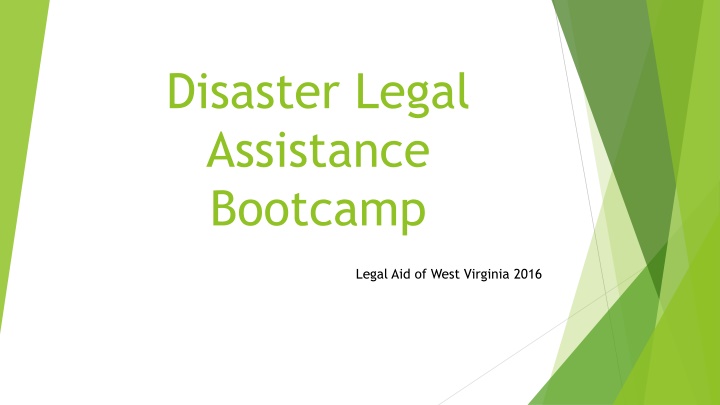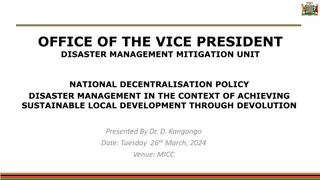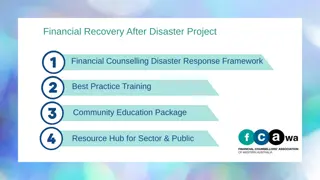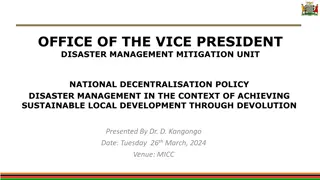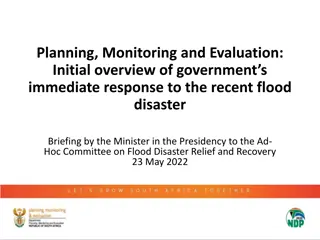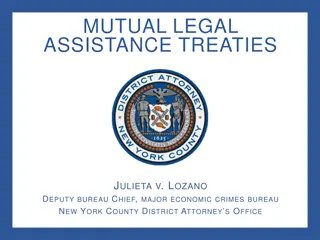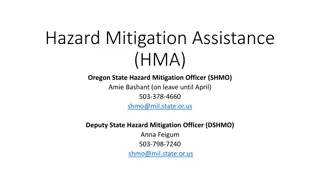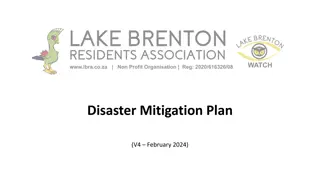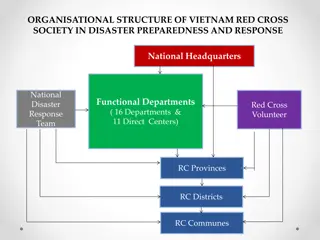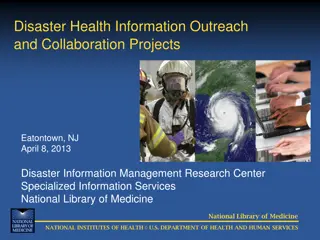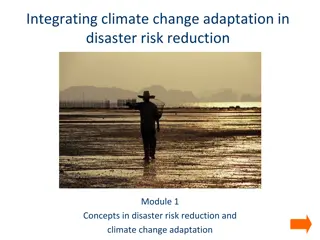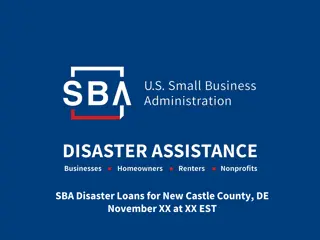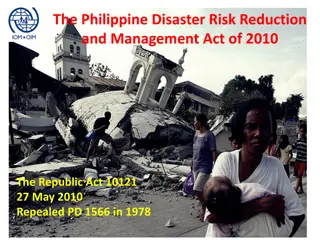Disaster Legal Assistance Bootcamp
This bootcamp by Legal Aid of West Virginia in 2016 focused on providing legal assistance during disasters. Participants learned valuable skills and knowledge in navigating legal challenges in such situations.
Download Presentation

Please find below an Image/Link to download the presentation.
The content on the website is provided AS IS for your information and personal use only. It may not be sold, licensed, or shared on other websites without obtaining consent from the author.If you encounter any issues during the download, it is possible that the publisher has removed the file from their server.
You are allowed to download the files provided on this website for personal or commercial use, subject to the condition that they are used lawfully. All files are the property of their respective owners.
The content on the website is provided AS IS for your information and personal use only. It may not be sold, licensed, or shared on other websites without obtaining consent from the author.
E N D
Presentation Transcript
Disaster Legal Assistance Bootcamp Legal Aid of West Virginia 2016
Critical Timelines Insurance (Homeowner s and/or Flood) 60 days to file from date of loss. Must start with insurance (FEMA auto-rejects if insurance claim has not been filed). If approved through insurance but it will take more than 30 days then can use FEMA or SBA as a cash advance until money is received. If denied, then person can apply to FEMA (keep a copy of the denial). Denial letter must be dated and in writing. FEMA 60 days to file from the federal (not state) disaster declaration for SBA/FEMA. If FEMA requires additional documents, 10 days to comply. 60 days to appeal a denial or a FEMA award the recipient deems insufficient. Keep all receipts up to 7 years for Rental Assistance, in case FEMA later audits.
Encourage all to Apply to FEMA (and then SBA) FEMA does not replace at value. Rather, FEMA replaces property based on a formula, which may give less than fair market value. FEMA grant caps out at around $31,000. Cap includes: 1) personal property replacement, 2) real property repairs, and 3) temporary housing (e.g., hotels) or rent only (if paid directly to a landlord). Provides housing assistance regardless of income. However, can only be 1 application per household. Make sure the best mailing address is given for FEMA to mail materials. Remember: Person must apply within 60 days of the disaster declaration date for FEMA and/or SBA. Acceptance of an offered SBA loan is optional. A FEMA application is the only way to get referred to the Small Business Administration (SBA) (see next slide).
Small Business Administration (SBA) Loans: Low interest loans for individual disaster recovery SBA is the largest provider of disaster recovery funds. Business is a misnomer: FEMA will request persons, meeting certain criteria, to apply for an SBA Loan. All, even uninsured homeowners, should apply. If denied, person will be referred to FEMA for re-consideration (subject to FEMA s $31,000 grant cap). Acceptance of SBA Loan is optional: If approved, person has up to 6 months to accept/reject the loan (or specify a lesser amount of the loan to accept). SBA loans cap at $200,000 for primary home repair and $40,000 for personal property. SBA Loan s Interest Rates are around 2 % for those who cannot qualify for loans elsewhere and around 4% for those who can qualify elsewhere. Loan term length cap out at 30 years. Source: https://www.sba.gov/content/disaster-loan-program
Substantial Damage Substantial damage for FEMA means they believe the home is uninhabitable. When asked to estimate property damage a number must be given. Estimate should be based on a high priced contractor (even if a full survey has not been conducted) because failure to provide an estimate will result in a FEMA auto-denial. Client has assessment duty. The adjustor only does it as a courtesy. If no agreement, they must get an expert to do the Flood Insurance Proof of Loss by the deadline. Get your contractor to walk the property with the FEMA Flood Adjuster. It s much easier to push him up on the values and costs while he s making his report. It s very hard to do later. FEMA doesn t cover rental properties. Advise client that, if they wish to stay in the rental, they should offer to help repair/clean up the apartment.
FEMA Temporary Housing Assistance There is no income requirement for Rental Assistance. Rental Assistance can continue for up to 18 months, per the Stafford Act. Rental Assistance can only be used on a different dwelling from where person was living at the time of the disaster. Person must keep receipts for Rental Assistance for a period of 7 years. Initial rent payment is for 2 months (renter). Additional rental needs past the initial 2 months (renter) requires submitting rent receipts and an additional form. Can be eligible up to 18 months if person can continue to establish need. According to Title 44 CFR 206.11: Occupant-Owner Person who does not hold title in the home and pays no rent but is responsible for rent, upkeep of the house, or that person has a life occupancy can qualify for FEMA funds for the lost house.
FEMA Temporary Housing Assistance Continued: If person has flood insurance, they will initially be denied until they provide their flood insurance policy and a letter stating that they do not have displacement coverage. For Flood Insurance: They must submit a FEMA Flood Insurance Proof of Loss within 60 days of the damage, or whatever the extended deadline might be, if it gets extended. Homeowner s displacement coverage won t apply if this is a flood event. Person must send the insurance policy and letter; FEMA will re-process. If denied, should appeal or apply for legal assistance to help with appeal. Remember: They have 60 days from the date of the declaration to apply. They have 60 days from the date of FEMA denial letter to appeal.
Flood Insurance/Homeowners Insurance Must apply through personal flood insurance and/or homeowner s first. FEMA or SBA can provide an advance on flood insurance proceeds or can address difference between insurance pay-outs and damages If the insurance company isn t going to settle within 30 days, people can write a letter to either FEMA or SBA and use FEMA or SBA money as an advance on insurance. They must pay it back when they get their insurance money! Renters can have flood insurance for their personal property in a rented home/trailer/apartment FEMA flood Insurance has an ombudsman program now, if you are in disagreement. See: www.floodsmart.gov
Other Helpful Homeowners Information: Beware of Fraud Advise clients not to let contractors talk them into signing over FEMA or insurance proceeds directly to the contractor. Advise owner that there are predatory contractors who will attempt to scam homeowners by overcharging or performing sub-standard work. Always get a copy, Homeowners should contract with trusted licensed and bonded professionals with a history in the area. Advise them to always get a copy of a contact they sign with contractor at the time of signing. Never sign contracts on iPads! Mortgage co. will get the insurance check in client s name and theirs most have rules about how they release the money, i.e., in increments, based upon completion. Save all receipts, will be requested without warning by FEMA for control auditing.
Personal Property Personal property includes vehicles, covered as transportation. Personal property will not be replaced at value but rather at an amount assigned by a FEMA formula.
Transportation Assistance FEMA will provide assistance and issue a check to people to pay for repairing or replacing a primary vehicle, which is necessary for transportation, and which was damaged by the disaster. In other states, FEMA is denying coverage to those who lost vehicles in the flood if the vehicle: (1) Did not have at least minimum liability coverage as required by the state, or (2) was not properly registered.
Always Remember to Tell Them: Keep receipts for 7 years. Only use the money for what FEMA tells you it s for. Failure to do so could result in being ineligible for later help like the CDBG- DR Program- Community Development Block Grant: a disaster program that will repair or rebuild damaged homes we anticipate it, but won t know if we have it or the rules of the program, for about a year.
Lost Documents Driver s License: Contact the West Virginia Division of Motor Vehicles at 304- 558-3900. For more information go to: www.transportation.wv.gov/dmv/. DMV is not requiring verification docs for people just needing a replacement. No fee either. Social Security Card: There is not a current emergency procedure to replace a Social Security card. They need to complete an Application For A Social Security Card (Form SS-5). You need another form of identification, such as a driver s license. The process is explained on the Social Security website at www.ssa.gov. They can also call 1-800-772-1213 or visit a local Social Security office. Birth/Death /Marriage/Divorce Certificates: For records from West Virginia you should contact the Health Statistics Center at DHHR. Call 1-877-448-3953 or to http://www.wvdhhr.org/bph/hsc/vital/birthcert.asp for more information. They can request records in person (Charleston), by mail or online. If they are not able to pay for copies, they may be able to work with a charity or state agency to get a copy for free (W.Va. Code Section 16-5-29(c)). To request these records from other states, visit the National Center for Health Statistics website at http://www.cdc.gov/nchs/w2w/index.htm
Lost Documents Continued Debit Card/Checks: Lost Checks- Have them call their bank as soon as possible. The bank will tell you how to report lost checks and get replacements. Debit/Credit cards Contact the financial institution that issued the card as soon as possible. If they do not know the number call the FDIC at 1-877-275- 3342. They should call even if they do not need a new card. Many banks and credit card companies may be willing to waive some fees and payments due to disasters. Advise them to contact credit card companies even if a new card is not required because some may be willing to waive some fees and payments due to disasters. Major credit card companies include: American Express: 1-800-992-3404 / www.americanexpress.com Discover: 1-800-347-2683 / www.discover.com MasterCard: 1-800-627-8372 / www.mastrcard.us/ VISA: 1-800-847-2911 / www.usa.visa.com
Supplemental Nutrition Assistance Program (SNAP) Replacement Loss of food bought with SNAP must be reported and requested by using the DFA-SNAP-36 form by Friday, July 22, 2016. Reports must be made to either the local DHHR office or the DHHR customer service hotline (1-877-716-1212). Only one month s worth of food can be requested. Money for replacement of food will be put into their EBT account, which will then be able to be used to purchase more food. The same rules apply as for normal use of your SNAP payment.
Disaster Unemployment Assistance The deadline to apply for those living in Nicholas, Kanawha, and Greenbrier counties is Wednesday, July 27, 2016 The deadline to apply for those living in Clay, Fayette, Monroe, Roane, Summers, Pocahontas and Webster counties is Friday, July 29, 2016. Apply at the nearest WorkForce West Virginia office. To find the nearest WorkForce West Virginia office, visit www.workforcewv.org or call 1-800-252- 5627. They should request DUA if they lost their job due to disaster, even if self- employed. They do not have to live in the flood area to get the assistance. They may be able to get the help as long as they work in the flood area. What to bring when applying: Proof of past earnings, such as pay stubs or self-employment records, bank statements, and your most recent income tax form.
Disaster Unemployment AssistanceIf Denied: The appeal process is the same as for standard unemployment appeals. First decision made by Deputy, usually only on review of file without personal interaction. Appeal deadline: 8 days from date of mailing of decision. To appeal, go to local office and sign a form requesting appeal. No statement of issues or reasons required. Next level is ALJ evidentiary hearing, held in local office or by telephone. Normally set within 2 to 3 weeks. ALJ typically issues decision 1 to 2 weeks after hearing. Same appeal deadline and method. Next level: Three-person Board of Review in Charleston. No new evidence taken; review on record of hearing. Oral and/or written argument. Appeal deadline: 30 days to file in Circuit court of Kanawha County. Next level: Circuit Court. Decision on briefs, no oral argument. Expect minimum six months, more likely a year before decision.
Landlord and Tenant Issues If there is a lease, make sure they read it. It will likely say what happens in the event of a natural disaster. If there is no lease, the landlord is responsible for the repairs to the property. If the client s rental unit is totally or partially destroyed by a natural disaster, he/she may be able to: temporarily reduce rent until the unit is repaired, end the lease if the unit is not repaired after a reasonable time, or sue the landlord for failure to reduce rent while the unit is damaged or not repaired.
Landlord and Tenant Issues Continued: Landlord should be notified immediately of any damages via a letter (certified mail is best). Make sure client keeps a copy of the letter. After being notified, the landlord has a reasonable amount of time to make repairs. If landlord wants the client to make repairs, make sure that it is in writing and that the client saves receipts. Any agreements between the landlord and client need to be in writing. If the client is suing, make sure they take pictures or video of the damage; call the building inspector, fire department, or county health department to inspect the property; collect evidence that the home was in a declared disaster area; and keep track of important dates, like when the natural disaster occurred or when the landlord was contacted about the damage.
Landlord and Tenant Issues Continued: Withholding rent is a possibility. However, it is not usually a good choice because the landlord could sue for eviction. Rent can be withheld when (1) the damage makes the property unlivable, (2) the landlord knows about the problem, and (3) the landlord is given a reasonable time to fix the problem. Steps clients should take to withhold rent: (1) Let the landlord know of the damage in writing. Certified mail is best. Keep copies of what is sent. (2) Give the landlord time to fix the problem. (3) If the problem isn t fixed, write the landlord another letter saying you will be withholding rent for that reason. DO NOT SPEND THE RENT. Must have cash in hand when you go to court.
Landlord and Tenant Issues Continued: If they are in public housing, the Public Housing Authority may have a duty to move the renter to similar housing if the property is not livable. There are special rules when you have a Section 8 voucher. The Public Housing Authority must be contacted to transfer the Section 8 voucher to a new rental. Must get approval before moving. Will be issued a move packet. Follow the rules to move. If they don t, they could lose housing voucher.
FREQUENTLY USED & ASKED FOR PHONE NUMBERS DHHR Customer Service Center: 1-877-716-1212 WorkForce West Virginia: 1-800-252-5627 (to find nearest office) West Virginia Insurance Commission: 1-888-TRY-WVIC (1-888-879-9842) Website: http://www.wvinsurance.gov/ FEMA Customer Support: 1-800-621-3362
